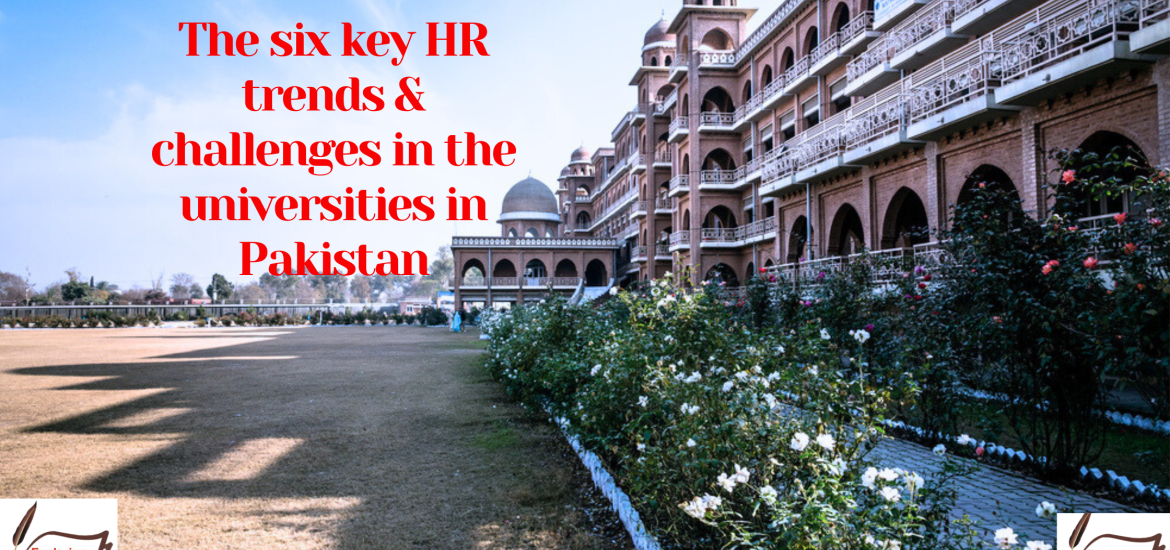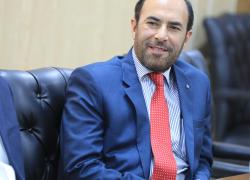The six key HR trends and challenges in the universities in Pakistan
In the face of intense global competition, technological revolution and innovative business processes, universities in this region have been following highly orthodox, traditional and very conventional human resource management practices. Social media, legal and judicial activism, new legislations, accountability, unionism and mushroom growth of the universities are some of the major driving forces, harnessing new trends and posing multiple HR challenges in the universities. Hence, the HR managers, policymakers, management practitioners and academics need to take cognizance of these environmental forces, while formulating HR policies and strategies.
The blog post, “Challenges Confronted by the Higher Education Institutes in Pakistan”, some of the major problems confronted by the institute of higher education are discussed in details in order to provide the policymakers and academic leadership with a deeper insight for future reforms and sustainable improvement in the higher education sector. This article highlights some of the key environmental factors paying the way for futuristic HR trends in the higher education institutions in Pakistan. The next blog post shall deliberate upon the emerging HR challenges in the public sector universities in the country.
This blog post highlights some of the key environmental factors paying the way for futuristic HR trends in the higher education institutions in Pakistan. The next blog post shall deliberate upon the emerging HR challenges in the public sector universities in the country.
Social Media
In today’s academic world, social media has emerged as a powerful business tool for managing people, particularly, in the domain of staffing, communication and capacity building. Online social platforms enriched our learning experiences by creating a collaborative working environment for managers and employees to share and discuss issues amenably and informally. This culminated in a paradigm shift in HR, cultivating more openness in the system and ultimately calling for the right mix of HR. The universities will have to adjust to these changes and to keep abreast of the new developments, ward off confinement in the ivory tower and avoid the embarrassment of unnecessary litigations.
Legal and Judicial Activism
With the emergence of independent judiciary and strengthening of grievances re-dressel mechanisms such as the establishment of Service Tribunal and the Office of Ombudsman in Pakistan, frequency of cases having recourse to the Courts of Law for settlement have multiplied in the recent past. These cases, primarily, engross a broad range of areas, particularly, students’ affairs, examination matters and affiliation cases. Nevertheless, the bulk of these issues, fall in the domain of HR. This not only increased expenditure on account of hiring legal councils by the universities but also put the institutions of higher education into the public spotlight getting unprecedented attention from media, policymakers and government functionaries. The academia will have to keep an eye on these developments to keep away from distractions.
Accountability
Since the rising cost of higher education has exceedingly been felt by the taxpayers, universities are compelled to demonstrate that they are accountable while undertaking fresh recruitment, promoting, awarding fringe benefits, and utilizing the available pool of human resources. With a view to have a number of anti-corruption agencies and accountability bodies, functioning in the country, looking into the matters pertaining to illegal practices in the universities that ultimately help in undertaking HR audit, bringing in transparency and causing merit-based decision making in the academia.
Unionism
The role of the unions and associations of various cadres of employees emerging in almost all public sector universities in Pakistan have a strong role in transforming HR practices in universities in many ways. For example, resistance to unfair changes, improvement in workplace relations and fairness in all kinds of decisions making have remained some of the areas which would inevitably maintain and improve the working environment in the universities. On the other hand, at times, these associations engage in unnecessary rifts and frictions engendering serious HR issues and a plethora of litigations.
Enactment of new legislations
With promulgation of new legislation such as Right to Information (RTI) and Whistleblower Protection Law, the management of the universities have become extra cautious while dealing with HR affairs, particularly, recruitment and selection, as these legislations are aimed at holding the management and officials of the universities accountable besides having strong sanctions in case of non-compliance. Similarly, numerous amendments in the universities’ act, statutes and rules made in the recent past to provide for the career path and internal promotion of the staff have future prospects with serious HR complications.
Mushroom growth of universities
The phenomenal growth in the number of universities both in the public as well as private sector in the recent past have HR implications as qualified faculty and experienced administrative staff is hard to find and retain. Approval of the proper HR policy guidelines, statutes, rules and regulations from the statutory bodies has remained intriguing as the key decisions making bodies are not fully functional in the newly established universities, in the first instance. This multiplied the HR challenges in both the established as well as newly founded universities. The hiring of retired professionals, though not experienced in the HR, besides multitasking are some of the key strategies adopted by the universities to overcome these problems.
Conclusion and recommendations
In a nutshell, social media, accountability, unionism, new legislations and mushroom growth of the universities are some of the driving forces paving the way for key trends and multiple HR challenges in the universities. It is suggested that the role of the HR managers, academic leaders and universities top management has changed in a number of ways and has become more multifaceted and complex. Hence, they need to become proactive to anticipate new trends and challenges while designing HR policies and strategies. HR managers and management practitioners in the universities have to understand the far-reaching consequences of these macro-environmental forces and to formulate HR policies and strategies accordingly. A full-fledged HR department and a strong legal team shall be required for the universities for smooth, efficient and effective functioning.


















